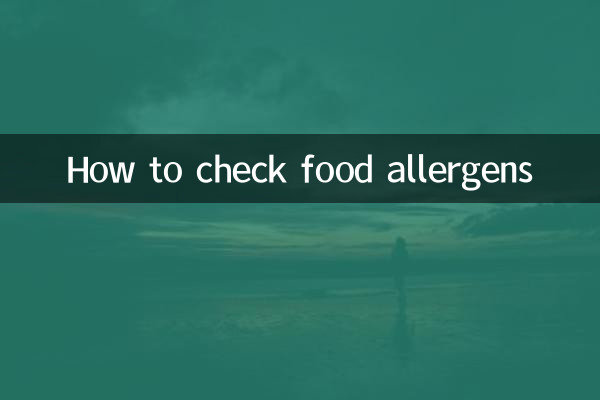How to check food allergens
In recent years, food allergies have attracted increasing attention. Many people will experience allergic reactions after eating certain foods, which can be itchy in the skin, and at worst, itchy in the breathing process and even in shock. Understanding how to detect food allergens is essential to health. This article will introduce in detail the detection methods of food allergens, common allergens and related data to help you better deal with food allergies.
1. Common symptoms of food allergies

Food allergic reactions usually occur within minutes to hours of allergen intake, and common symptoms include:
| Symptom Types | Specific performance |
|---|---|
| Skin symptoms | Itching, redness, urticaria, eczema |
| Digestive system symptoms | Abdominal pain, diarrhea, nausea, vomiting |
| Respiratory Symptoms | Nasal congestion, runny nose, cough, difficulty breathing |
| Systemic symptoms | Allergic shock (in severe cases, life-threatening) |
2. Common food allergens
Here are some of the most common food allergens that have higher chances of causing allergies in the population:
| Allergen Category | Specific food |
|---|---|
| Nuts | Peanuts, walnuts, almonds, cashews |
| Seafood | Shrimp, crab, shellfish, fish |
| Dairy products | Milk, cheese, yogurt |
| Eggs | Eggs, duck eggs |
| Cereals | Wheat, barley, oats (gluten allergies) |
| Beans | Soybeans, peas |
3. Testing methods for food allergens
If you suspect you are allergic to a certain food, you can test it by:
| Detection method | Specific operations | advantage | shortcoming |
|---|---|---|---|
| Skin prick test | Drop a small amount of suspected allergen extraction liquid on the skin and gently pierce the surface of the skin with a needle | Fast and low cost | False positive or false negative may occur |
| Blood test (IgE test) | Blood is drawn to detect IgE antibody levels for specific allergens | No need for contact with allergens, suitable for severe allergies | Higher cost, and the result may take longer |
| Food exclusion method | Gradually eliminate suspicious foods and observe whether the symptoms improve | No professional equipment required, can be done at home | Long time, food and drink must be strictly recorded |
| Oral food excitation test | Gradually consume suspicious food under the supervision of a doctor, and observe the reaction | Accurate results | High risk and requires professional medical personnel to operate |
4. How to prevent food allergies
The key to preventing food allergies is to avoid exposure to known allergens and take the following measures:
1.Read food labels carefully:Many packaged foods are marked with allergens that may contain, such as “may contain nuts” or “dairy products are also processed on the production line.”
2.Tell the waiter when dining out:When dining in a restaurant, clearly inform the waiter about your allergies and avoid accidentally eating allergic food.
3.Carry first aid medication with you:For severe allergies, you should carry an adrenaline automatic syringe (such as EpiPen) with you in case of emergency needs.
4.Regular review:Allergies may change over time, and regular allergic testing is recommended, especially in children.
5. Misconceptions about food allergies
Regarding food allergies, there are some common misunderstandings that need to be clarified:
| Misconception | fact |
|---|---|
| Allergies will naturally disappear as you age | Allergies in some children may decrease with age, but allergies in adults usually last for life |
| Eating a small amount of allergic food can be desensitized | This practice is extremely dangerous and can lead to severe allergic reactions |
| Food intolerance and food allergies are the same | Intolerance usually does not involve the immune system, with mild symptoms and life-threatening |
6. Summary
Food allergies are a health issue that needs to be taken seriously. Through scientific testing methods, allergens can be accurately identified and effective preventive measures can be taken. If you or your family have food allergies, it is recommended to consult a professional doctor in time for a comprehensive test and evaluation. Remember that early detection and proper management are key to coping with food allergies.

check the details

check the details